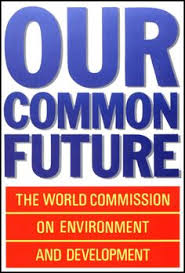 In the mid-1980s the World Commission on Environment and Development defined sustainable development in its report Our Common Future, (also referred to as the Brundtland Report, named after the commission’s chair, Gro Harlem Brundtland, who was prime minister of Norway at the time) as:
In the mid-1980s the World Commission on Environment and Development defined sustainable development in its report Our Common Future, (also referred to as the Brundtland Report, named after the commission’s chair, Gro Harlem Brundtland, who was prime minister of Norway at the time) as:
development that meets the needs of the present without compromising the ability of future generations to meet their own needs.
In October 1987, the goal of sustainable development was largely accepted by the governments of one hundred nations and approved in the UN General Assembly.
Many of the key voices in the drive for sustainable development have an agenda that most environmentalists would not accept were it made explicit. For this reason environmentalists should be wary of grasping onto what seems to be common ground in the fight to protect the planet without first examining the implications of such liaisons.
Sustainable development is not about giving priority to environmental concerns, it is about incorporating environmental assets into the economic system to ensure the sustainability of the economic system. Sustainable development encompasses the idea that the loss of environmental amenity can be substituted for by wealth creation; that putting a price on the environment will help us protect it unless degrading it is more profitable; that the `free' market is the best way of allocating environmental resources; that businesses should base their decisions about polluting behaviour on economic considerations and the quest for profit; that economic growth is necessary for environmental protection and therefore should take priority over it.
Sustainable development literature and government policy documents are dominated by neo-classical economic concepts and generally promote the ‘free’ market as the best way of allocating environmental resources. This is no accident but is a consequence of the persistent advocacy of free market solutions by influential corporate-funded think tanks (see also Free Market Environmentalism).
Sustainable development seeks measures that do not interfere unduly with business activity. It does not include a cultural critique of modern society nor of industrial progress, consumption or limitless economic growth. Rather it incorporates meanings and assumptions which legitimise rather than challenge the existing capitalist order (see below).